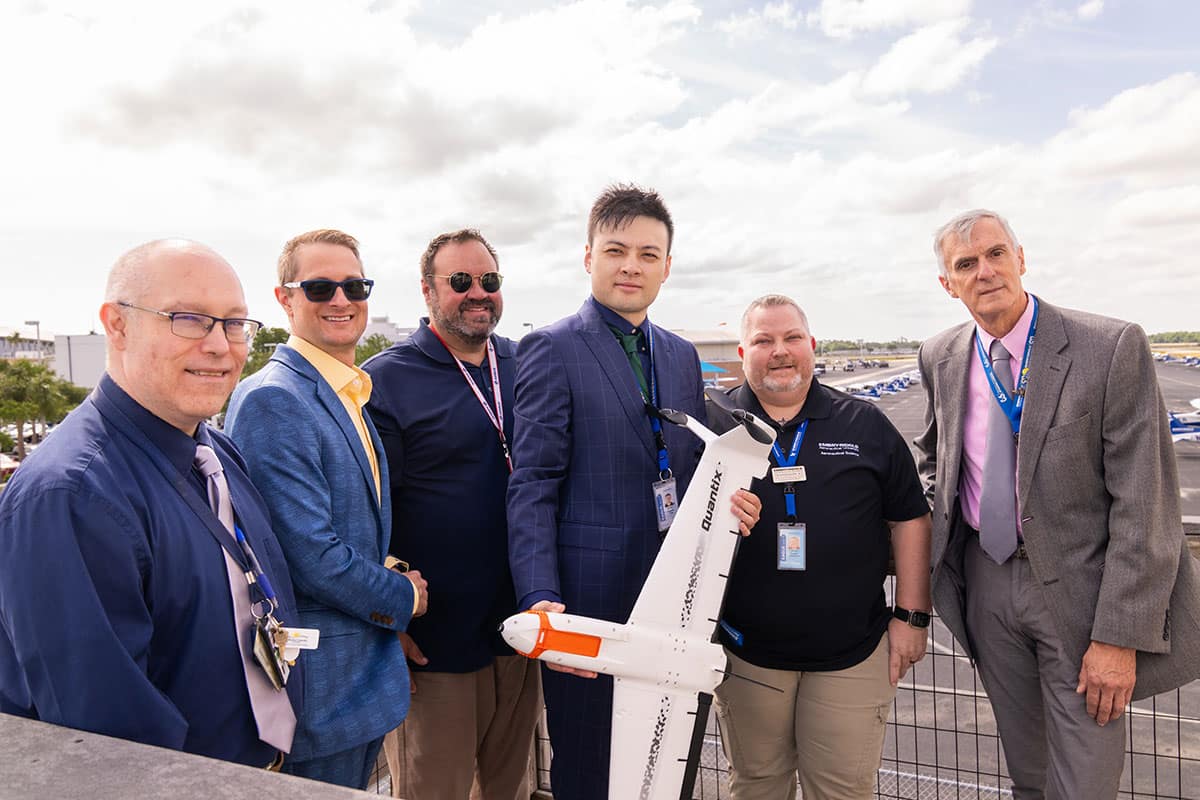Embry-Riddle Team Receives Federal Grant to Train First Responders in Drone Operations for Disaster Response

Researchers at Embry-Riddle Aeronautical University have been awarded a grant by the U.S. Department of Homeland Security to participate in an effort to train first responders to more effectively integrate uncrewed aircraft systems (UAS) into emergency response scenarios.
“This training empowers flight coordinators and first responders with the knowledge to communicate across agencies,” said Dr. Chuyang Yang, assistant professor in the School of Graduate Studies. “First responders need to make real-time decisions under pressure and coordinate with both air and ground assets. This training includes preparing for roles coordinating both crewed and uncrewed aircraft to ensure safe, efficient and mission-aligned deployment during emergencies.”
Yang points out that drones can provide perfect solutions in hazardous or rapidly evolving situations.
“Their ability to be quickly deployed, paired with their relatively low cost and minimal risk to human life, makes them ideal for missions like search and rescue, perimeter surveillance and damage assessment,” Yang said.
Drones equipped with advanced sensors, such as high-resolution and thermal cameras, “make them indispensable in disaster scenarios like wildfires,” Yang said. Drones can also assist in assessing structural damage when it is unsafe for people to enter on the ground.
Introducing drones into emergency response, however, requires training and coordination. The training being developed, which is sponsored by the Federal Emergency Management Agency (FEMA) and led by Mississippi State University’s ASSUREd Safe program, “is designed to bridge the gap between first responders and other airspace stakeholders during disaster response,” Yang said.
The training for first responders would encompass basic aviation knowledge, including such topics as aviation regulations, airspace classification, flight restrictions and FAA compliance, as well as an understanding of the capabilities of UAS platforms, Yang said. Training in coordination with a standardized system for the management of emergency situations, known as the Incident Command System, is also needed, he added.
Assessing how many emergency agencies have UAS training or operate drones — data that is currently lacking — is part of the overall training initiative.
Unauthorized UAS have interfered with disaster response efforts. Drones have entered restricted areas in more than 40 incidents. For example, a drone struck a Super Scooper aircraft fighting the Los Angeles wildfire in January. The damage grounded the water-bombing plane for five days.
“While this training alone can’t prevent such disruptions, it will significantly improve preparedness and response,” Yang said. “Participants will be better equipped to anticipate, identify and respond to potential UAS intrusions, supporting the broader goal of maintaining safety and security in the national airspace system.”
Other Embry-Riddle researchers who will participate in the project are Dr. Ryan Wallace, Timothy Ehrenkaufer and Dr. John Robbins of the Department of Aeronautical Science; Dr. Michael McCormick of the Department of Applied Aviation Sciences; Dr. Scott Winter of the School of Graduate Studies; and Dr. Stephen Rice of the Department of Human Factors and Behavioral Neurobiology.
“Their interdisciplinary expertise is instrumental in shaping a curriculum that meets both technical and operational needs in emergency UAS training,” Yang said.
Robbins, chair and professor of the Department of Aeronautical Science, expressed enthusiasm for the project.
“We have seen the UAS industry exponentially evolve over the last few years. The efficiencies created by the advancement of technology are unbounded,” he said. “However, users must have a complete understanding of operational considerations to safely integrate new technologies into existing infrastructure. Embry-Riddle is happy to support projects that lead the way to accelerate innovation, especially those that enhance safety.”
Students who would be interested in participating in the project may email Dr. Yang at yangc11@erau.edu.

 Michaela Jarvis
Michaela Jarvis